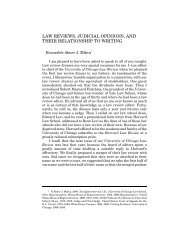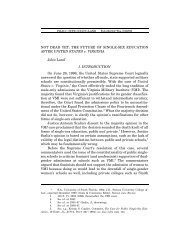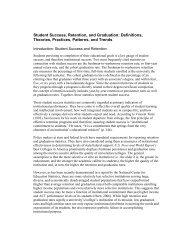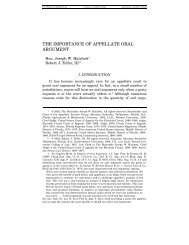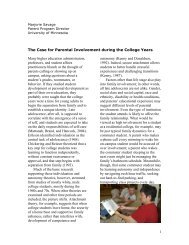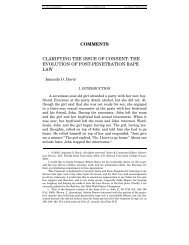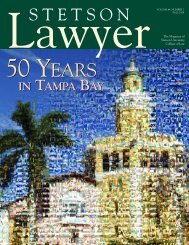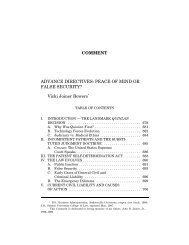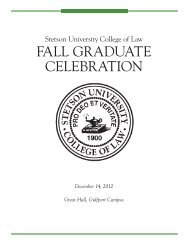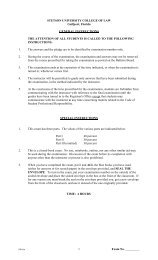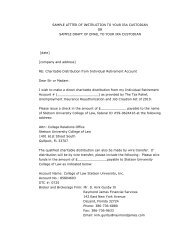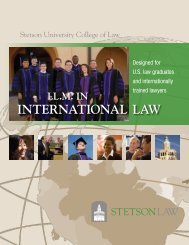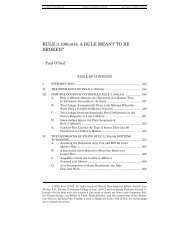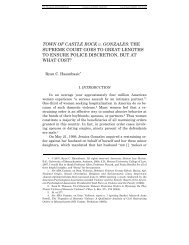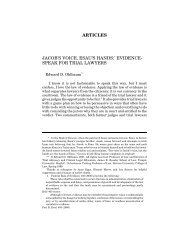Lawyer - Stetson University College of Law
Lawyer - Stetson University College of Law
Lawyer - Stetson University College of Law
You also want an ePaper? Increase the reach of your titles
YUMPU automatically turns print PDFs into web optimized ePapers that Google loves.
N e w s B r i e f s<br />
Dees compared today’s prejudice against Latino<br />
workers in the U.S. to the contempt for Irish immigrants<br />
in the 1800s. He urged students to fight for equality and<br />
to follow the ideals established by Dr. Martin Luther<br />
King Jr., reminding them <strong>of</strong> Dr. King’s words: “We will<br />
not be satisfied until justice rolls down like waters and<br />
righteousness like a mighty stream.”<br />
The annual Inns <strong>of</strong> Court banquet brings together<br />
lawyers, local judges, pr<strong>of</strong>essors and law students to<br />
exchange ideas and experiences in the tradition <strong>of</strong> the<br />
original Inns <strong>of</strong> Court in England.<br />
U.S Court <strong>of</strong> Appeals for Veterans Claims meets on<br />
Gulfport campus for oral arguments<br />
A panel <strong>of</strong> three judges from the U.S. Court <strong>of</strong><br />
Appeals for Veterans Claims came to the Gulfport campus<br />
on Feb. 15 to hear oral arguments in <strong>Stetson</strong>’s Florin<br />
Roebig Courtroom. The court’s national jurisdiction<br />
allows it to hear oral arguments anywhere in the country,<br />
and it travels about five times a year.<br />
Students in <strong>Stetson</strong>’s Veterans’ Benefits course<br />
attended the oral arguments as the culmination <strong>of</strong> their<br />
class. The one-week course was designed and taught by<br />
Pr<strong>of</strong>essor Michael Allen and Judges <strong>Law</strong>rence Hagel and<br />
Mary Schoelen, who both served on the veteran’s claims<br />
court and were <strong>Stetson</strong>’s Jurists in Residence for 2008.<br />
Sixty-four students participated in the class.<br />
Judge Robert N. Davis, who became a member <strong>of</strong><br />
the court in December 2004, is also an adjunct pr<strong>of</strong>essor<br />
and former full-time pr<strong>of</strong>essor at <strong>Stetson</strong> and member <strong>of</strong><br />
the Center for Excellence in Advocacy advisory board.<br />
Judge Davis regularly invites outstanding <strong>Stetson</strong><br />
students and graduates to work for<br />
him at the court as interns or clerks.<br />
Legal stylist Bryan Garner to<br />
legal community: Speak<br />
persuasively, write persuasively Bryan Garner<br />
Renowned legal stylist Bryan<br />
Garner presented a seminar on legal writing at <strong>Stetson</strong>’s<br />
Gulfport campus February 17.<br />
“Learning to write in your practice will be bad for<br />
your clients, your reputation and the reputation <strong>of</strong> the<br />
practitioners <strong>of</strong> law in general.”<br />
According to Garner, after students acclimate to law<br />
school or practice, many “have forgotten how to write<br />
a paragraph that would even earn a C- in an English<br />
class,” and those who do not fall into the trap <strong>of</strong> writing<br />
in legalese have to compensate for colleagues who have.<br />
In a series <strong>of</strong> interviews Garner conducted with judges<br />
about writing preferences, he found that every single one<br />
was “intensely passionate” about the issue. He <strong>of</strong>fered a<br />
list <strong>of</strong> writing problems that hinder a lawyer’s ability to<br />
persuade a judge: long-winded writing, overusing “shall,”<br />
and not presenting the thrust <strong>of</strong> the message on the first<br />
half <strong>of</strong> the first page.<br />
Garner emphasized the importance <strong>of</strong> writing in<br />
the most effective manner possible, in lieu <strong>of</strong> merely<br />
following the conventions <strong>of</strong> one’s law firm. “(There)<br />
are only two things that lawyers need to do well: speak<br />
persuasively and write persuasively,” said Garner. “Any<br />
failure to adapt to the needs <strong>of</strong> a judge will inhibit your<br />
ability to do either.”<br />
Pictured left: Attorneys<br />
prepare to present arguments<br />
before the U.S. Court <strong>of</strong><br />
Appeals for Veteran’s Claims<br />
during hearings held at<br />
<strong>Stetson</strong>’s Florin Roebig<br />
Courtroom in February.<br />
S p r i n g / S u m m e r 2 0 0 8



